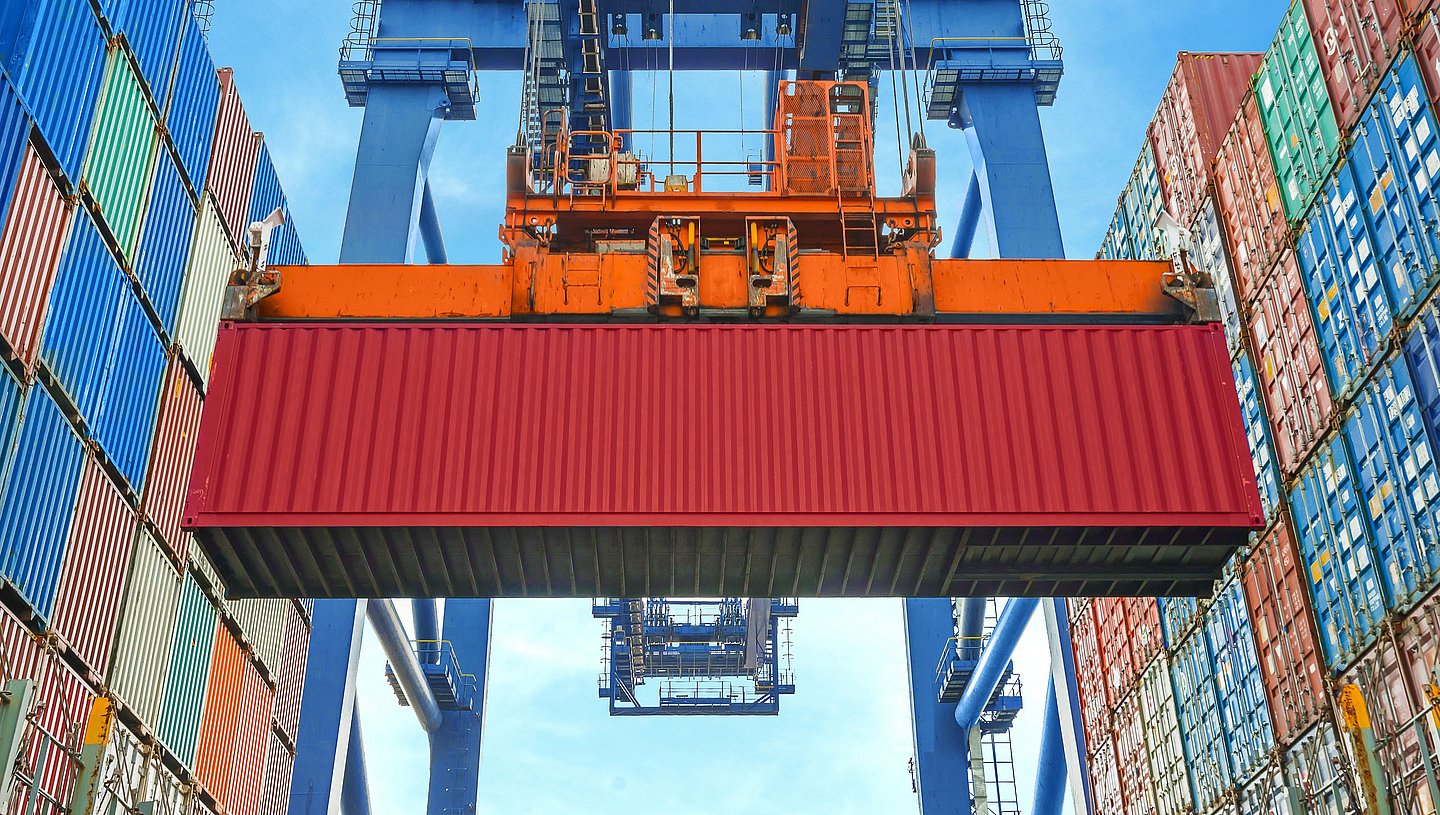Foreign trade with Germany and the EU is restricted by complex national and international rules and regulations, which are continually changing due to the current geopolitical situation and existing conflicts worldwide. Exporting and importing businesses must pay close attention to a multitude of national, European, and international regulations and make arrangements for internal compliance.
In addition, the monitoring of foreign direct investments is gaining increasing importance.
Export Control
Export control
International trade, allowed in general under the concept of free trade, is restricted by complex national and international regulations that are subject to continual change due to the current geopolitical situation and several conflicts around the globe. For one, depending on the country of destination, a company may face restrictions on the export of goods (i.e., commodities, services, technology and software). Embargoes, in particular, significantly restrict trade with sanctioned countries. In addition to the country of destination, the (end) recipient of a good is an important criterion for determining any export restrictions. No business may be conducted with individuals, organizations, and companies on “blacklists.” In addition, trade restrictions may relate to specific goods to be exported and their intended use. Military equipment and dual-use goods (i.e., goods that can be used for both military and civilian purposes), for example, may only be exported upon the approval of the German Federal Office for Economic Affairs and Export Control (“BAFA”).
Companies find it difficult to comply with national and European trade restrictions due to scientific and technological progress on the one hand and the complexity of today’s supply chains on the other. In the event of violations of export restrictions, it is not only the acting individual but also management and the company itself that face severe fines and even imprisonment. Export regulations are not only violated when goods are physically exported but may already occur upon entering into a supply contract. For this reason, export control must start at the time the contract is initiated and continue until the business transaction has been fully completed.
We have many years of experience in advising on export control law in business practice and support our clients
- planned export projects are in accordance with German and European export control laws,
- in sanctions list screening,
- in remedying infringements of export control law,
- when applying for shipment and export licenses, exemption certificates, and requesting information on prohibited goods at the Federal Office for Economic Affairs and Export Control, and the Federal Ministry for Economic Affairs and Climate Action,
- in other communications with customs authorities, the Federal Office for Economic Affairs and Export Control, and the Federal Ministry for Economic Affairs and Climate Action,
- in identifying liability risks arising from export law violations as part of corporate mergers and acquisitions,
- in judicial and extrajudicial action against imposed export restrictions,
- in drafting contracts to help avoid violating export laws, and
- in structuring international supply chains in collaboration with our partner law firms abroad.
Investment Control
Investment Control
If a foreign investor acquires a German company, the investor must report the acquisition to the Federal Ministry of Economics if the company is active in certain security-relevant economic sectors.
This reporting obligation also applies if the stakes acquired in a company represent at least 10% or (depending on the economic sector) 20% of the voting rights. This also applies to asset deals. It does not matter whether the acquisition is made directly by a foreign investor or indirectly (for example, by a German or EU-based subsidiary). The decisive factor is whether a foreign investor directly or indirectly holds at least 10% or 20% of the voting rights in the acquirer.
The security-relevant economic sectors are set out in a list that is regularly updated. These include, for example, certain companies in the defense industry, critical infrastructure (energy, water, food, IT/telecommunications, healthcare, finance/insurance, transportation/traffic), the media industry, the healthcare/pharma industry, artificial intelligence, autonomous driving/flying, robotics, the semiconductor industry, raw materials extraction or agriculture.
If a reportable acquisition is not reported, the acquisition is provisionally ineffective until it is cleared. In addition, the exercise of voting rights and the exchange of certain company-related information (even in the due diligence phase) is prohibited until such clearance. Violations are subject to penalties and fines and can be punished with imprisonment of up to five years or a fine or fines of up to EUR 500,000.00.
Even for acquisitions that need not be reported, the Federal Ministry of Economics and Technology may examine the acquisition on its own initiative if the foreign acquirer acquires at least 25% of the voting rights. They may do so for up to five years after the acquisition became final under contract law (signing). To avoid this sword of Damocles and have deal certainty, the acquirer can apply to the Federal Ministry of Economics for a clearance certificate.
If the Federal Ministry of Economics and Technology comes to the conclusion that a particular acquisition will affect public order or safety, it can prohibit the acquisition, impose certain conditions or negotiate a public-law contract to eliminate the safety concerns. A transaction may also be prohibited or restricted after the acquisition has been completed (closing).
For this reason, foreign investors should plan their acquisitions carefully and with foresight. Investors must pay particular attention to reporting requirements and take into account the extra time such review procedures will take when scheduling their transactions.
We have many years of experience in advising on investment control proceedings and have successfully assisted numerous clients with obtaining clearance for their planned acquisitions. Having worked on numerous proceedings, we have good contacts to the relevant decision-makers in the Federal Ministry of Economics and can also clarify many questions informally. We support our clients in particular
- whether there is a reporting obligation for the planned acquisition,
- in reporting the acquisition,
- in applying for clearance certificates for acquisitions,
- in supporting the client if an investment examination is initiated,
- participation in hearings, and
- in negotiating acquisition agreements under public law.
Customs Law
Customs law / Import sales tax / Excise duties
Import and export are governed by customs law, a part of which are the well-known import duties. These include the classic customs duties on imports, the import sales tax, excise duties, and other duties, in particular on agricultural products, and anti-dumping surcharges.
- Customs
Customs duties in the classical sense are imposed on imported goods and are intended to protect producers in the EU against low-priced goods from third countries. - Import sales tax
In addition to customs duties and special excise duties, import sales tax is levied by the German customs administration on goods imported from third countries. The import sales tax corresponds to the value-added tax incurred on the consumption or sale of goods and the provision of services within Germany and/or on deliveries within the European Union. - Excise duties
The German customs administration also levies excise duties on alcohol, mineral oil, tobacco products, coffee, etc., so as to burden these goods in the same way as goods within the European Union. - Anti-dumping surcharges
Anti-dumping charges are a tool to protect the EU’s industry in international trade against unfair trade practices of third countries.
The monitoring of imports, where import licenses are required for goods, is another aspect of customs law.
At the same time, the monitoring of exports is also part of customs law. Exports must always be declared, and the customs administration checks and monitors whether the necessary export licenses have been obtained or whether an export is prohibited. This procedure serves in particular to monitor compliance with prohibitions and restrictions in foreign trade, for example in relation to embargoes and dual-use goods.
The movement of cash across borders is also monitored.
We advise and support our clients
- when applying for customs authorizations and easements,
- in defending against import duties imposed after the fact (customs duties, excise duties, etc.),
- in proceedings for waivers and refunds of import duties,
- in examining notices, in waiver and refund proceedings, and in subsequent collection and appeal proceedings,
- in dealing with the authorities and complying with formalities,
- in relation to anti-dumping measures,
- support during customs audits such as foreign trade audits or company audits,
- in enforcing claims for damages and public liability under civil law, and
- in cases of border seizure.
Reporting Requirements
Reporting requirements under the Foreign Trade and Payments Ordinance
When companies operate internationally, they must comply with the reporting requirements stipulated in the Foreign Trade and Payments Ordinance. According to Sections 63 et seqq. of the Foreign Trade and Payments Ordinance, payment, inventory, and asset notifications must be submitted to Deutsche Bundesbank at regular intervals for the purpose of drafting the balance of payments for the Federal Republic of Germany. Irrespective of the industry, both Deutsche Bundesbank and the customs authorities regularly check whether companies and banks are complying with their reporting obligations in foreign trade.
Incorrect or incomplete notifications or those that are submitted late constitute violations of the Foreign Trade and Payments Ordinance. According to Section 19(6) Foreign Trade and Payments Ordinance, each violation is punishable by fines of up to EUR 30,000.00 by the competent customs authorities. In addition, fines may also be imposed on the individuals acting on behalf of the company, as it may constitute a breach of supervisory duty pursuant to Section 130(1) Act on Regulatory Offenses in connection with violations of foreign trade legislation. In addition, a fine may be imposed on the company itself, as an association of persons within the meaning of Section 30 Act on Regulatory Offenses.
Section 22(4) Foreign Trade and Payments Act allows for self-disclosure as a possible path back to legality. Under certain conditions, such disclosure may serve to exempt the offender from prosecution.
We advise and support our clients in
- complying with regulatory requirements of reportable matters in payment and capital transactions,
- identifying reportable matters,
- preparing subsequent registrations,
- filing self-disclosures exempting from prosecution, and
- optimizing reporting processes.
White Collar Crime Law in Foreign Trade
White collar crime law in foreign trade
Due to the German economy’s export strength but also its export dependency, the Customs Investigation Service focuses on investigations into violations of foreign trade law, which provides the statutory framework for international trade with companies in Germany.
Violations of foreign trade law are mainly governed by the Foreign Trade and Payments Act as a special matter, supplemented by the provisions of general penal law, regulatory offense law, and by further special statutory provisions – such as the law on arms control. Due to the ever-changing global political situation, businesses must pay particular attention to this area in addition to issues arising from rapid scientific and technological progress and the complexity of today’s supply chains. Companies must ensure and take appropriate precautions to ensure compliance with the requirements of national and European trade restrictions at all times.
Our advice in this field focuses on
- support and assistance in company searches,
- advising and defending individuals and businesses in proceedings relating to penal law and regulatory offenses,
- appraising critical issues, and
- support in implementing various projects that may involve criminal or regulatory risks.
Investment Protection
Investment Protection
In pursuing business opportunities, German companies often invest directly abroad. Foreign direct investments (FDI) have an increased risk profile, as they can be jeopardized by changes in the laws, revocation of administrative acts or other measures taken by the administration or jurisdiction of the foreign state.
Foreign investments should therefore not be made without investment protection law advice. This is because the right structuring can minimize risks arising from different protection standards and can secure better investment protection.
Since 1959, Germany has concluded more than 130 investment protection treaties (BIT) as well as numerous multilateral treaties. Worldwide, there are approximately 3,000 bilateral and multilateral investment promotion and protection treaties (investment protection treaties).
As a rule, investment protection treaties contain the following standards of protection:
- Protection against expropriation without compensation,
- Fair and equitable treatment (FET),
- full protection and security,
- Most favored nation treatment (MFN),
- National treatment (protection against discrimination),
- protection against breach of governmental commitments ("umbrella" clause),
- unrestricted transfer of capital and earnings.
The EU has also concluded several free trade agreements with investment protection in recent years, e.g. the EU-UK Trade and Cooperation Agreement and the European-Canadian Trade agreement CETA, as well as the investment protection treaties agreed with Singapore, Vietnam and Mexico to accompany the free trade agreements. Further agreements are currently being negotiated.
Since the ECJ ruled in what became known as the Achmea judgment that so-called intra-EU investment protection agreements are contrary to European law and invalid, 23 member states have terminated the intra-EU investment protection agreements between them by means of a termination agreement dated May 5, 2020. This agreement also terminated 13 investment protection treaties concluded by Germany.
We have the necessary expertise and advise our clients in the following areas
- Determining the international investment protection to which an investment is entitled
- Optimization of investment protection for planned projects as well as existing investments
- Assessment of potential investment protection claims against host states
- Representation vis-à-vis host states to enforce investment protection claims
- Representation in investment arbitration proceedings
- Representation in the enforcement of arbitral awards
Compliance
Compliance
The legal requirements in business are enormous. An individual, company-specific compliance culture, with specific concepts and structures to avoid legal errors, significantly minimizes the risks incurred by management, particularly in foreign trade. We comprehensively advise private and public companies, municipalities and institutions, as well as general managers, members of executive and supervisory boards, and other management personnel on all aspects of compliance.
We advise and support our clients in
- introducing and optimizing compliance management systems to prevent liability risks and damage,
- implementing whistleblower systems,
- implementing compliance monitorship or compliance supervision, and
- conducting internal investigations in cases of suspicion or in parallel with official proceedings.
13th package of sanctions against Russia adopted
On February 21, 2024, the EU adopted the 13th package of sanctions against Russia since the start of the war in Ukraine. As of February 24, 2024, the EU sanctions list is to be expanded by almost 200 additional individuals and companies to around 2,000. The result is further asset freezes, entry bans and business bans, including for the first time on companies from China and Turkey that were involved in circumventing previous sanctions via military technology.
read more...
11th EU sanctions package against Russia announced
The EU Commission recently adopted its proposal for the 11th EU sanctions package against Russia. EU member states are now required to consult on the draft of the new sanctions package. Further sanctions can only be imposed if the 27 member states agree on a new sanctions package. The President of the EU Commission, Ursula von der Leyen, has already announced parts of the further planned sanctions in a press statement: The 11th sanctions package focuses on combating sanctions evasion. To this end, the Commission has proposed the introduction of a new sanctions instrument. The aim of this new instrument seems to be the sanctioning of exports to third countries, if the exported goods reach Russia this way. In addition, so-called "shadow entities" from Russia and third countries that intentionally circumvent EU sanctions are to be subject to sanctions. There are also plans to extend the existing transit bans, in particular by adding technology products and aircraft parts to the list of goods.
FEU creates legal framework for issuing sanctions against persons/companies responsible for destabilization of the Republic of Moldova
Since June 2022, the Republic of Moldova has been considered an EU candidate country. As the country is particularly affected by destabilizing measures as a result of Russia's attack on Ukraine, it has requested assistance from the EU. Against this backdrop, the EU has now established a legal framework that allows it to sanction individuals and companies responsible for undermining or threatening Moldova's sovereignty and independence or democracy, the rule of law, stability, or security in Moldova (see Regulation (EU) 2023/888 and Decision (CFSP) 2023/891).
The measures created by the EU include, on the one hand, a ban on entry into the EU and, on the other hand, the imposition of financial sanctions. These include the so-called ban on disposal ("freezing of assets") and the so-called ban on making funds or economic resources available, directly or indirectly, to sanctioned parties.
So far, no sanctions have been imposed on individual persons or companies; this requires further acts of implementation.
From October 2023, notification requirements for M&A transactions and procurement procedures under the Regulation on Non-EU Subsidies will apply.
The Regulation on Non-EU Subsidies ("VDS") empowers the EU Commission to review financial contributions from non-EU states to companies operating in the EU and to take action against any resulting distortion of competition. It affects all economic activities in the EU and covers in particular mergers (M&A transactions) and public procurement procedures, which in future must be reported to the Commission in accordance with the VDS.
After the EU adopted the VDS in record time in 2022, 74 private individuals, companies and interest groups have now taken advantage of the opportunity granted by the Commission to comment on the draft procedural rules for the enforcement of the VDS by 06.03.2023. The Commission will take this feedback into account in determining the final rule on procedural aspects related to the control of third party subsidies. The process is expected to be completed by the end of June 2023, as the VDS will apply from 12/07/2023.
From 12.10.2023, companies will then have to notify their participation in public procurement procedures and involvement in M&A transactions to the EU Commission if they have received subsidies from non-EU states that exceed the relevant thresholds. The Commission is then empowered to make the award of a contract in the context of a public procurement procedure or to make a merger conditional on the fulfillment of requirements or even to prohibit it.
In view of the prohibition of enforcement during the procedure and the substantial fines that may be imposed for violations of the VDS, the procedure for controlling third-country subsidies should be taken into account in particular when planning M&A transactions in addition to merger and foreign trade law investment control.
Renewed tightening of Iran sanctions
The EU has again tightened sanctions against Iran and added more than 30 additional individuals and companies to the Iran Sanctions List (see Implementing Regulation 2023/379 of February 20, 2023). As a result, the assets of these sanctioned parties are frozen (so-called freezing order) and no funds or other assets may be made available to them (so-called provision ban). The extension of sanctions against Iran has already entered into force on 20.02.2023.
Price cap set for Russian petroleum products
Having already set the price cap for Russian crude oil in December (we reported), the EU, in cooperation with the Price Cap Coalition, has now set two price caps for petroleum products originating in or exported from Russia (see Regulation (EU) 2023/250, Implementing Regulation (EU) 2023/251):
- USD 45/barrel for petroleum products traded below the price of crude oil (e.g., fuel oil), and.
- USD 100/barrel for those petroleum products that trade above the price of crude oil (e.g. aviation fuel).
Provided these price ceilings are observed, the prohibitions on the carriage of petroleum products by sea to third countries and related services do not apply. For petroleum products purchased at a higher price and shipped before Feb. 1, 2023, a transition period until April 1, 2023, applies.
For guidance, the EU has updated its guidance on the application of price caps and its FAQ on the import of Russian oil.
EU prepares 10th sanctions package against Russia
The EU is currently preparing the 10th sanctions package against Russia. EU Commission President Ursula von der Leyen announced that the new EU sanctions should be adopted by February 24, 2023. Under the new sanctions package, Russia would no longer have access to technologies used in particular by the Russian military; these would include drone components, for example. In addition, the expansion of the EU financial sanctions list and the establishment of mechanisms to prevent the circumvention of existing sanctions are at the heart of the new sanctions package.
Updating Annex I of the EU Dual-Use Regulation
With Regulation No. 2023/66, which entered into force on January 12, 2023, the EU Commission recasts Annex I of the Dual-Use Regulation ("Dual-Use List"). The Dual-Use List contains those dual-use items (i.e. items that can be used for both private and military purposes) for which a license is required when exported from the territory of the EU. The changes to the dual-use list mainly affect the electronics, semiconductors and computers, chemical and biological sectors, as well as aerospace and propulsion technology.
Amendment of the Export List
With the entry into force of the 19th Ordinance Amending the Foreign Trade and Payments Ordinance ("AWV") on 24 December 2022, the Export List has been amended. The Export List is an annex to the AWV and contains in particular military and nationally controlled dual-use goods, i.e. goods that can be used for both private and military purposes. A non-binding synopsis of the old and amended versions of the Export List is available on the homepage of the Federal Office of Economics and Export Control (BAFA).
Price cap for crude oil set
The announced price cap for transporting Russian oil to third countries outside the EU is USD 60 per barrel (see Implementing Regulation (EU) 2022/2368). In the future, European operators will only be allowed to trade Russian oil with non-EU countries or transport it to third countries if the cap on the purchase price per barrel is respected. The setting of the price ceiling does not affect the restrictions applicable to the import of Russian oil into the EU.
Sanctions violations meet new "EU criminal offence"
The EU has imposed a large number of restrictive measures (sanctions) aimed at weakening the Russian economy, especially since Russia's aggression against Ukraine. Currently, the sanctions are not implemented uniformly within the EU; in particular, the facts and penalties for violations of sanctions are inconsistently structured within the EU.
In order to harmonize the implementation of sanctions across the EU, the Council of the EU has decided that violations of restrictive measures constitute an EU criminal offense (Council Decision (EU) 2022/2332 of November 28, 2022). The EU Commission is now required to submit a proposal for a directive establishing criminal offenses and penalties for sanctions violations, which must be accepted by the European Parliament and the Council.
Russia Sanctions
On February 24, 2022, the Russian Federation launched its attack on Ukraine in violation of international law. The governments of many states as well as the EU have strongly condemned the actions of the Russian Federation and have already tightened the existing sanctions against the Russian Federation several times. Since February, the EU has issued six sanctions packages against Russia, including targeted restrictive measures against individuals (individual sanctions), economic sanctions, barriers to the movement and trade of goods with Russian individuals and companies, and diplomatic measures. Complementing these, the EU has imposed sanctions on Belarus in response to its involvement in the invasion of Ukraine.
The sanctions imposed on the Russian Federation pose numerous challenges for European companies. With no total embargo in place against the Russian Federation to date that would prohibit all trade with Russia, European companies must review their Russian business partners and transactions with Russia for compatibility with the ever-changing sanctions against the Russian Federation.
Measures initiated by the EU include:
- Restricting the sale/export of numerous goods to Russia/Belarus (in particular, high-tech products, dual-use goods, software, goods for the oil refining and aerospace industries, luxury goods)
- Restriction of import of various goods from Russia/Belarus (e.g. wood, fertilizers)
- Numerous individuals and organizations are personally sanctioned: Their assets are frozen and no funds or economic resources may be made available to them.
For more information on the EU’s individual packages of sanctions, click here:
1st package of sanctions of February 23, 2022
2nd package of sanctions of February 25, 2022
3rd package of sanctions of February 28, 2022
4th package of sanctions of March 15, 2022
5th package of sanctions of April 08, 2022
6th package of sanctions of June 03, 2022
The aforementioned EU Regulations apply directly in Germany. The enforcement of sanctions frequently fails, however, due to a lack of rules on responsibility, insufficient digital networking of the competent authorities, and a lack of powers of intervention. In cases involving sanctions and embargoes, for example, it has not been possible to identify assets and seize property until the ownership status has been clarified. Additionally, sanctioned individuals were able to continue to use their economic resources, such as real estate and vehicles, as only their funds, especially those held in bank accounts, were “frozen.” The First Act on More Effective Enforcement of Sanctions, which entered into force on May 28, 2022, is intended to remedy this situation now.
For more information on the First Act on More Effective Enforcement of Sanctions, click here. For more information, please also visit our CIS Desks site.
Publications (selection)
- Überblick über die Sanktionen der Europäischen Union gegen Russland, die russischen Gegensanktionen und ihre Auswirkungen auf die Unternehmenspraxis, Compliance-Berater 1-2/2023, S.1-7 von Anna Richter, LL.M., Tatiana Vorotnitskaya, k.i.n. (Belarusian State University)
- Achtes Sanktionspaket der EU gegen Russland in Kraft, Update Compliance 23/2022, von Sonja Groht, Michael Kreisler, LL.M.
- Verkauf von Anteilen an russischen GmbHs (OOO) nur noch mit Genehmigung möglich, Update Russian / CIS Desk, September 14, 2022
- Erneute Verschärfung der EU-Sanktionen gegen Russland und Belarus, Update Compliance 16/2022, by Sonja Groht, Michael Kreisler, LL.M.
- Dr. Elke Umbeck ausgewählt für die EU Schiedsrichterliste unter den EU-Handelsabkommen, press release, Jun 29, 2022
- Sanktionsdurchsetzungsgesetz I - Effektivere Durchsetzung von Sanktionen gegen Russland, Update Compliance 14/2022 by Anna Coenen
- 5. Sanktionspaket gegen Russland in Kraft, Update Compliance 11/2022 by Sonja Groht, Michael Kreisler, LL.M.
- Viertes Maßnahmenpaket gegen Russland in Kraft getreten, Update Compliance 8/2022 by Sonja Groht, Michael Kreisler, LL.M.
further Publications
further Publications
- Ausweitung der EU-Sanktionen gegen Belarus, Update Compliance 5/2022 by Sonja Groht, Michael Kreisler, LL.M.
- Erneute Ausweitung der EU-Sanktionen angesichts der Ukraine-Krise - Was ist zu tun?, Update Compliance 3/2022, by Sonja Groht, Michael Kreisler, LL.M.
- Verschärfung der EU-Sanktionen gegen Russland, Update Compliance 2/2022, by Sonja Groht, Michael Kreisler, LL.M.
- AWV-Meldepflichten – Ein Bußgeldrisiko für Jedermann, CCZ 2021, p. 26 ff. by Anna Coenen
- China bleibt draußen, Frankfurter Allgemeine Zeitung GmbH, Frankfurt. „China bleibt draußen“, F.A.Z. vom December 16, 2020, by Bodo Dehne, Michael Kreisler, LL.M.
- Neues Exportkontrollgesetz zwingt Unternehmen zu Achtsamkeit, ASIA BRIDGE 12:2020 by Dr. Kai Bandilla, Bodo Dehne
- Schärfere Investitionskontrolle erschwert M&A-Transaktionen - Bundesregierung untersagt Übernahme von deutschem Satellitenunternehmen, Udate Corporate/M&A No. 14, December 4, 2020 by Bodo Dehne, Michael Kreisler, LL.M., Dr. Christoph Schork, LL.M.
- German foreign investment control tightened amidst Covid-19 pandemic, IBA Corporate and M&A Law Committee eBulletin, Summer 2020 by Bodo Dehne, Boris Dürr
- Geplante Novellierung des Außenwirtschaftsgesetzes (AWG), Update Corporate/M&A 05, April 21, 2020 by Bodo Dehne, Dr. Christoph Schork, LL.M.
- Iran-Sanktionen der USA und die Reaktionen der EU, ComplianceBusiness 4/2018, p. 19 ff. by Anna Coenen
- Kündigung des Iran-Atomabkommens durch die USA: Handlungsbedarf für deutsche Unternehmen, Update Compliance 7/2018 by Dr. André-M. Szesny, LL.M. and Anna Coenen
- Teil 2 der Sanktionen der USA gegen den Iran in Kraft gesetzt, Update Compliance 13/2018 by Anna Coenen
- Verschärfte Regeln für die Beteiligung von unionsfremden Investoren an deutschen Unternehmen, October 25, 2017 by Dr. Kai Bandilla, Bodo Dehne
- Höhere Hürden bei Übernahmen, ASIA BRIDGE 9:2017, www.asia-bridge.de by Dr. Kai Bandilla, Bodo Dehne
Lectures (selection)
- Aktuelle Risiken im internationalen Handel, die Sie kennen sollten!, Webinar, August 19, 2022, by Dr. Christoph Schork, LL.M. and Michael Kreisler, LL.M.
- Meldepflichten im Außenwirtschaftsrecht – Theorie und Praxis, In-house-Lecture, March 2022, by Anna Coenen
- Die Selbstanzeige im Außenwirtschaftsrecht – Goldene Brücke in die Legalität?, Compliance-Breakfast, September 13, 2017, by Anna Coenen
- Nachmeldung von Zahlungen und Forderungen/Verbindlichkeiten gemäß der AWV, In-house-Lecture, September 2016, by Anna Coenen

![[Translate to English:] Anna Coenen](/fileadmin/_processed_/6/5/csm_Coenen__Anna_print_0060865f8c.jpg)
![[Translate to English:] Sonja Groht](/fileadmin/_processed_/a/1/csm_Groht__Sonja_print_5a648c4e64.jpg)




![[Translate to English:] Dr. Katharina Prasuhn](/fileadmin/_processed_/0/b/csm_Prasuhn__Dr._Katharina_Print_print_77b0531cbf.jpg)
![[Translate to English:] Dr. Christoph Schork, LL.M.](/fileadmin/_processed_/7/5/csm_Schork__Dr._Christoph_print_a36d790a97.jpg)
![[Translate to English:] Dr. Frederik Wiemer](/fileadmin/_processed_/b/d/csm_Wiemer__Dr._Frederik_print_2cebe09e67.jpg)
![[Translate to English:] Dr. Elke Umbeck](/fileadmin/_processed_/d/5/csm_Umbeck__Dr._Elke_print_28a137cb77.jpg)
![[Translate to English:] Dr. Jonas Pust](/fileadmin/_processed_/0/b/csm_Pust__Dr._Jonas_print_81ad8b8215.jpg)




![[Translate to English:]](/fileadmin/_processed_/6/5/csm_Coenen__Anna_print_6ff48c69c4.jpg)

![[Translate to English:]](/fileadmin/_processed_/a/1/csm_Groht__Sonja_print_80a7d341bf.jpg)



![[Translate to English:]](/fileadmin/_processed_/0/b/csm_Pust__Dr._Jonas_print_24ac492831.jpg)
![[Translate to English:]](/fileadmin/_processed_/7/5/csm_Schork__Dr._Christoph_print_25944edbfb.jpg)
![[Translate to English:]](/fileadmin/_processed_/d/5/csm_Umbeck__Dr._Elke_print_5fa924fde6.jpg)


